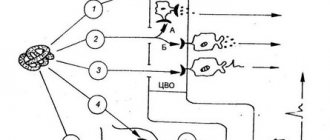What is compassion?
Compassion is a quality that allows one to renounce evil towards another living being due to the awareness of the possible suffering that a person’s actions will entail. Compassion is the understanding that humanity is higher than those desires and base impulses that can be satisfied by causing suffering to others. This applies to both crimes and more everyday things, such as methods of manipulation, resentment, tyranny, anger, greed, anger and so on. Compassion counters any sins that cause harm to others, not only in other people, but also in oneself. After all, the first thing a truly compassionate and kind person will do is stop bringing suffering to other living beings through their words, deeds and lifestyle.
Compassion is the ability to refrain from actions that would result in the suffering of others, as well as the desire to reduce the suffering of other living beings.
Such a quality as compassion is a certain form of sacrifice of one’s interests for the sake of peace and joy of others. Despite the fact that sacrifice most often involves low and ignorant habits, this is all perceived very hard and negatively. After all, any victim goes through his own pain. On the other hand, inflicting pain on others is much easier and somehow more common than on oneself. Compassion points out our inability to change for the sake of others, for the sake of those for whom we live, act and work.
We often notice only one side of the coin, preferring to ignore the fact that even the fulfillment of worldly duties does not guarantee a good attitude towards us from those around us, since it is the lack of compassion that prevents us from seeing our own actions in their objective reflection. In other words, due to selfishness, we are not able to see that we are behaving incorrectly, preferring to justify our actions, look for those to blame and deny responsibility for the suffering of our neighbor . This is more like egocentrism, the center of which is the reluctance to feel remorse, because we all understand that even if we are not to blame, the suffering caused by our actions will not disappear anywhere.
Compassion sincerely shows us that it is better to endure pain ourselves than to bring pain to others. As we know, desires, ignorance and aspirations are at the root of causing suffering to other living beings.
When we really want to get something, we are ready to cause suffering to others. When we try to take out our inner dissatisfaction with life on others, we ignore the fact that we ourselves are capable of dealing with it. Lack of compassion makes a child out of a person, who himself is not able to reach his toy, and therefore constantly cries, gets offended and runs away from everyone. Such behavior may indicate immaturity and infantilism of the individual. But is it really possible to imagine an old holy sage who, because of his dissatisfaction, will cause suffering to other people, prove to them their inadequacy, take out insults, anger, fatigue and malice on them? This is impossible to imagine, since we all understand that the ability to understand one’s feelings, self-control and refusal to cause suffering to other living beings for the sake of one’s own desires are signs of a mature personality, which does not depend either on the movement of one’s own mood or on the attitude of others towards it .
How does it manifest itself?
Compassion is manifested in not causing suffering to others because of desires, dissatisfaction, or one's own suffering. This is the case when we are able to restrain pain or strong desires within ourselves, realizing that they can bring pain to others. A very young lover strives to put his beloved on a chain, declaring that only with him she will be better. This immature behavior is the essence of selfishness , which is contrary to compassion. A mature personality is more likely to give a person the opportunity to make a choice on his own, without playing on feelings, threatening or issuing ultimatums. Strong dependence on the outcome of an event in which violence must be used is an indication of a childish nature. Immaturity is a person who has not gained independence and is simply looking for a more profitable dependence that can bring as much pleasure as possible and as little suffering as possible.
We also recommend this article: Proper learning: repetition, not imitation.
A person who is satisfied with himself is one who has found the source of happiness in himself. Immature people cannot do this, and at the same time, compassion gives the opportunity to draw happiness from themselves. Conscience and understanding of one’s own rightness are one of the most important conditions for inner peace. If we are able to see that our happiness rests on the suffering of others, will we look at it? No. Rather, we will close our eyes and look for various excuses in the spirit of “the end justifies the means” or “if I hadn’t caused them suffering, then others would have done it.” In the end, a person can directly admit to himself that his own well-being is more important to him than the well-being of others - and this is a sign of the inability to find happiness for himself, within himself is an indication of immaturity.
A mature person is compassionate. His inner principles and conscience stand above base impulses, impulses or desires that lead to causing suffering to others, deception, violence, manipulation and use of others for his own purposes. The possibility of refusing these actions is dictated by knowledge, the root of which is the ability to see the consequences of one’s actions. A reasonable person recognizes that happiness obtained from the suffering of others can neither satisfy nor bring happiness to oneself . Therefore, he, realizing his actions, thoughts and deeds, is able to refuse such actions without causing suffering to other living beings.
The desire for one’s own happiness, which comes from within oneself, is not selfishness, it is human nature , the real “I”, and therefore, even if it may seem that a person’s desire to find happiness in this way is just selfishness, then it is the same That it is selfish to say that a deer’s desire to drink water is contrary to logic. Finding happiness is one of the goals of human life and coming to it through knowledge and compassion is the best way to find happiness.
Compassion is shown not only by not causing harm, but also by trying to help others get rid of suffering. The example of the Good Samaritan indicates that compassion should apply to all living beings, not to mention all people. Of course, we must beware of those who seek to use kindness for their own selfish purposes, but this is not a reason to refuse everyone, much less cause suffering. To deceive is a vice, but to be deceived is atonement. This is not immediately realized, but over time the understanding comes that compassion, which gave us the opportunity not to respond to evil, gave us the opportunity to become better and mature much stronger than revenge.
Compassion can manifest itself when we see that our abilities and capabilities can reduce someone else's suffering. This does not require astronomical sums or incredible work; sometimes a word or small action is enough to show significance to another person. Saying a nice word, showing patience and sympathy, fulfilling your duties properly and not demanding the same from others are manifestations of compassion.
So, compassion manifests itself in:
- refusal to cause suffering to others
- desire to alleviate the suffering of others
- awareness of the suffering of another living being
Popular writings
- Description essay based on the painting by Bayan Vasnetsov (for 9th grade)
The famous artist Viktor Vasnetsov dedicated more than one painting to the Russian folklore and historical theme. One of these paintings is called Bayan. It is written based on the work - Examples of humanity from literature for an essay
What is humanity? It seems to me that this word means the totality of the best qualities inherent in a person: kindness, honesty, love, self-sacrifice - Characteristics of the city of Kalinov on behalf of Kuligin - an essay by
Alexey Nikolaevich Ostrovsky, a great Russian writer, was a master of words. Among his famous works, “The Thunderstorm” occupies a special place. The history of this work
Why is compassion important?
Compassion is valued as a virtue, a manifestation of conscience, knowledge and purity of a person’s heart, even humanity itself. Low people are not able to experience compassion, because they cannot control themselves and for them the fulfillment of their desires is more important than the happiness of others. The desire for compassion and its manifestation is a sign of high humanity, a sign of the right path. Indeed, in essence, compassion means that a person does not need to succumb to his low habits and aspirations for the sake of a crime against conscience. The heart and conscience of a compassionate person are pure, and therefore happiness is revealed to him. But can happiness be revealed in a desecrated heart? Obviously not. Compassion cleanses the heart, giving us the opportunity for redemption and forgiveness, which elevates us above any vices: anger, greed, envy, lust and others.
We value compassion as a quality that does not destroy our own happiness, that extends a helping hand to those who have fallen and to those in need. But would people do this if compassion itself did not inspire them with pure happiness? This way of acting purifies a person’s heart and thoughts, these are the qualities of sacrifice for the benefit of another, the quality of serving others. But this is not the service that a dog performs, this is the service that angels perform. Is it possible to look at a dog from below, is it possible to look at an angel from above?
We also recommend this article: Life is a game of death. What are the rules of this game and how to win it?
First of all, compassion is a guarantor of one’s own happiness and peace, as well as the ability to clearly realize that our own life is not a source of suffering for others. If our actions bring suffering, this very often means that we are driven by vices, and therefore we should think about whether we are showing the proper degree of compassion. Resentment and anger on the part of other people is undoubtedly a sign of their suffering inside, but understanding that they are only saying that they are hurt, will we cause them even more pain? Are we going to beat a soldier wounded in battle simply because he screams loudly in pain? The ability to compassion is the ability to look at people not from one’s own egoism, but from an awareness of their situation. Compassion makes it possible to see the hearts of others, since most are driven only by their own suffering and inability to find satisfaction in this life.
Facets of manifestation
Compassion is a special internal state that allows you to feel the pain of all living beings. But this feeling is not always sincere and correct. For example, someone through him asserts himself at the expense of the weak, develops a painful attachment.
When manipulated, the rescuer becomes an aggressor, displays anger and physical violence
In this state, the victim is unable to leave on his own. This kind of situation is not real compassion. Some people cannot empathize properly due to their soft nature. They are easy to manipulate, and they are willing to talk about misfortunes.
As a result, a sympathetic person does not see the difference between reasonable help and parasitism. He constantly helps morally and financially, then the victim lives well at someone else’s expense.
To develop the spiritual part of the personality, you need to engage in charity. This brings moral satisfaction, but it is worth remembering: help should be limited, while the person in need is taught to cope with problems on their own.
Each individual determines what different terms may mean to him, especially if they do not have strict definitions. Empathy and compassion are not much different. Both qualities are necessary for the existence of civilization. Without them, it would be difficult for people to coexist and do good deeds.
The ability to empathize and sympathize with others is called empathy, this feeling is very important for communication. With its help, one individual determines the boundaries of what is acceptable in communication with another person. This is especially important for psychologists and doctors who deal with the grief of others every day.
This quality helps make family life wonderful.
Through charity, people support each other in difficult times. This is how difficult situations are experienced: disasters, accidents, destructive natural phenomena. People from different countries provide assistance at such moments. Not even in a global sense, each individual decides for himself whether empathy is needed in life and how it should be manifested.
Compassion and the spiritual path
Compassion is correlated with the spiritual path - as one of the most important qualities that is necessary to begin progress on it. Compassion allows you to give up various material benefits for the sake of others, give up your material desires and act based on the desire for true good, and not temporary. Having dedicated himself to the spiritual path, a compassionate person must set a positive example in order not to become a source of temptation for others. Without many virtues, it is unlikely that one can really advance on the spiritual path, since it, without a doubt, is the complete opposite of the material one. On the spiritual path we renounce desires, and on the material path we strive for them. The spiritual path brings us purification and happiness, while material activities defile and condition us, involve us and make us dependent.
The most important manifestation of compassion on the spiritual path is the ability to refuse and refuse. True compassion moves a person towards eternal, spiritual good and the renunciation of various honors, pleasures and satisfaction of desires, in the context of compassion, is the realization that one’s own satisfaction cannot serve as a deliverance from the suffering of others, but on the contrary will serve as a source of many troubles. Therefore, refusing to use others for your material desires, realizing that this will lead to troubles, is a manifestation of spiritual compassion.
Compassionate refusal means not only the ability to say "no" to another person's desire to commit an indecent act that will cause suffering to others, but also the ability to withhold knowledge from another if there is a clear understanding that that person will use it for his own selfish purposes or if there is understanding that he will not understand them. Such compassion leads to the possibility of gradual growth of those around us, like any living being. If we strive to give knowledge to others out of false compassion, then this often results in suffering, since both the selfish and the unprepared for understanding will never reveal the truth, but will be able to use knowledge to justify their bad actions, which is a sign of lack of compassion.
Compassion is the ability to give up impulsive actions and desires, recognizing the pain of others and the possible suffering that subsequent actions will bring to others. It is also a desire to alleviate the suffering of other living beings, not only humans, but also animals. Compassion is a sign of a mature personality, since only a mature personality realizes that each person is essentially equal in his suffering and will experience pain if it is caused to him. The absence of egoism in a mature personality makes it possible to look at others not through the prism of one’s ego or desires, but truly, perceiving them with one’s heart, just like the observer himself.
With the help of compassion, a person is able to cleanse himself, as well as give a positive example and inspiration to others, also cleansing them both from suffering and from apathy and powerlessness.
Compassion is the ability to help others and through this, sacrificing oneself, atone for one’s previous sins, which every person has. Purification and atonement will allow you to experience happiness, just as wiping a window allows more light to leak through it. The source of happiness is always located within a person, and having freed perception from low aspirations, we will be able to feel it more and more. Good luck.








